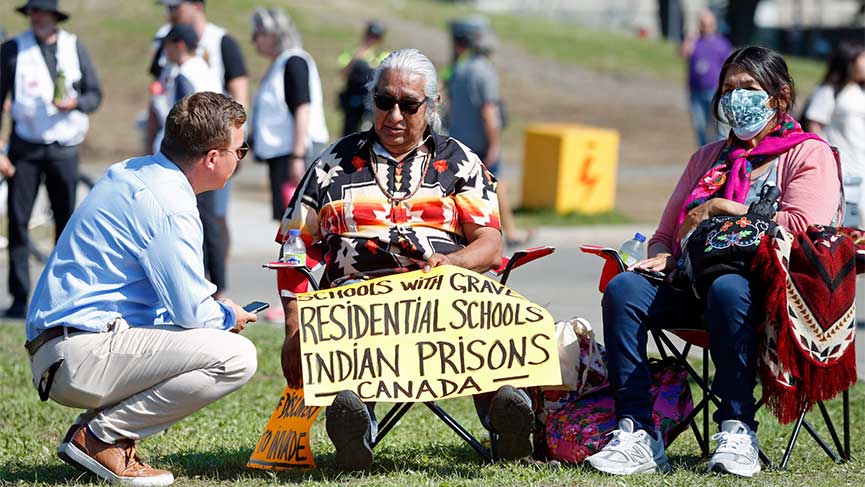Turning social doctrine into society transformed

National
On Sept. 17, a virtual event will launch a new Canada-wide chapter of the Centesimus Annus Pro Pontifice (CAPP) Foundation, established in 1993 by St. John Paul II.
Source - par Cecil Chabot, CAPP Canada Coordinator
If this means little to you, you may be among the many committed Canadian Catholics who are unaware of this uniquely lay-run Vatican foundation’s mission to promote deeper lay Catholic knowledge and practice of Catholic Social Doctrine. Catholic Social Doctrine is itself only a little better known than CAPP.
The launch of CAPP Canada, with its mission of “transforming Canadian Society through Catholic Social Teaching,” has taken on greater significance in the wake of the Holy Father’s recent penitential pilgrimage, in which he expressed an anger and profound sadness felt by many of us at the failure of “Christian” cultures, and the institutional Church itself, to uphold the Gospel. How could such evil be done, permitted or ignored, in the name of the Gospel, often by good people with good intentions?
The Catholic failures in this regard were failures to know and implement the core principles of Catholic Social Doctrine.
Pope Francis emphasized our need to learn from our past failures, but he also brought a message of hope, reminding us that the history of the Church’s relationships — with its Indigenous members and with non-Christian Indigenous alike — is not reducible to the negative lessons we must learn and integrate. This history, starting with Christ’s teachings and the path He opened to redemption from our deepest failings, also includes models that can inspire hope for the future, for Indigenous and non-Indigenous alike. And these models were consistent with Catholic Social Doctrine.
Overcoming Catholic ignorance of our own social teachings is a critical way of responding to Pope Francis’ call to make amends and do better. As his predecessor, Benedict XVI, has stated, the promotion and application of Catholic Social Doctrine is one of the three primary acts of mercy any Catholic can undertake. For example, to support a shelter for Indigenous homeless is vital. But it is no less important and often far more impactful to prevent such homelessness by working with Indigenous leaders to bring our social, cultural, political and economic structures and practices into greater conformity with Catholic Social Doctrine’s core principles of human dignity, solidarity and subsidiarity.
In the late 1940s, a delegation representing Indigenous and non-Indigenous Catholics presented to a special joint committee of the Senate and House of Commons, set up to investigate the operation of the Indian Act and “Indian administration.” This delegation asserted that Canadians needed to understand that inculturation is a two-way street, that non-Indigenous Canadians needed to meet Indigenous peoples halfway, in true solidarity, in a process of learning and integrating the best of each other’s cultures.
Imagine how differently the last two summers, or the last two centuries, might have looked in Canada (and the U.S.) if this example of Catholic Social Doctrine in practice had been closer to the norm than the exception. Imagine if the Church itself had always been a model of solidarity among its Indigenous and non-Indigenous members, of working together for the common good and drawing the best of Indigenous and non-Indigenous cultures into deep and respectful dialogue on the question of what it means to be human and to live well in relation to our human and other-than-human world.
Imagine if the Church had been a model of subsidiarity, showing profound respect for the integrity of Indigenous families and for the self-determination of Indigenous peoples, affirming their right to be free from coerced integration into the Canadian State. Imagine if the Church had always upheld the human dignity of Indigenous people, rejecting not only overt racism but also more subtle forms of prejudice and dehumanization. Imagine if Catholic charity had always been caritas, a self-giving love that does not impose itself or diminish the other, but sees, emphasizes and cultivates the goodness of the other.
Imagine if the religious freedom of Indigenous Catholics and non-Christian Indigenous had been defended with equal firmness and consistency. Imagine if the Church had never lost sight of the gifts that Indigenous peoples — Catholic and non-Catholic alike — contribute to the Church and society as a whole.
CAPP Canada seeks to help turn those imagined outcomes into reality starting 1 p.m. (ET) on Sept. 17. More information on CAPP Canada is at www.cappcanada.ca/launch.

Comment
Comment
Add new comment